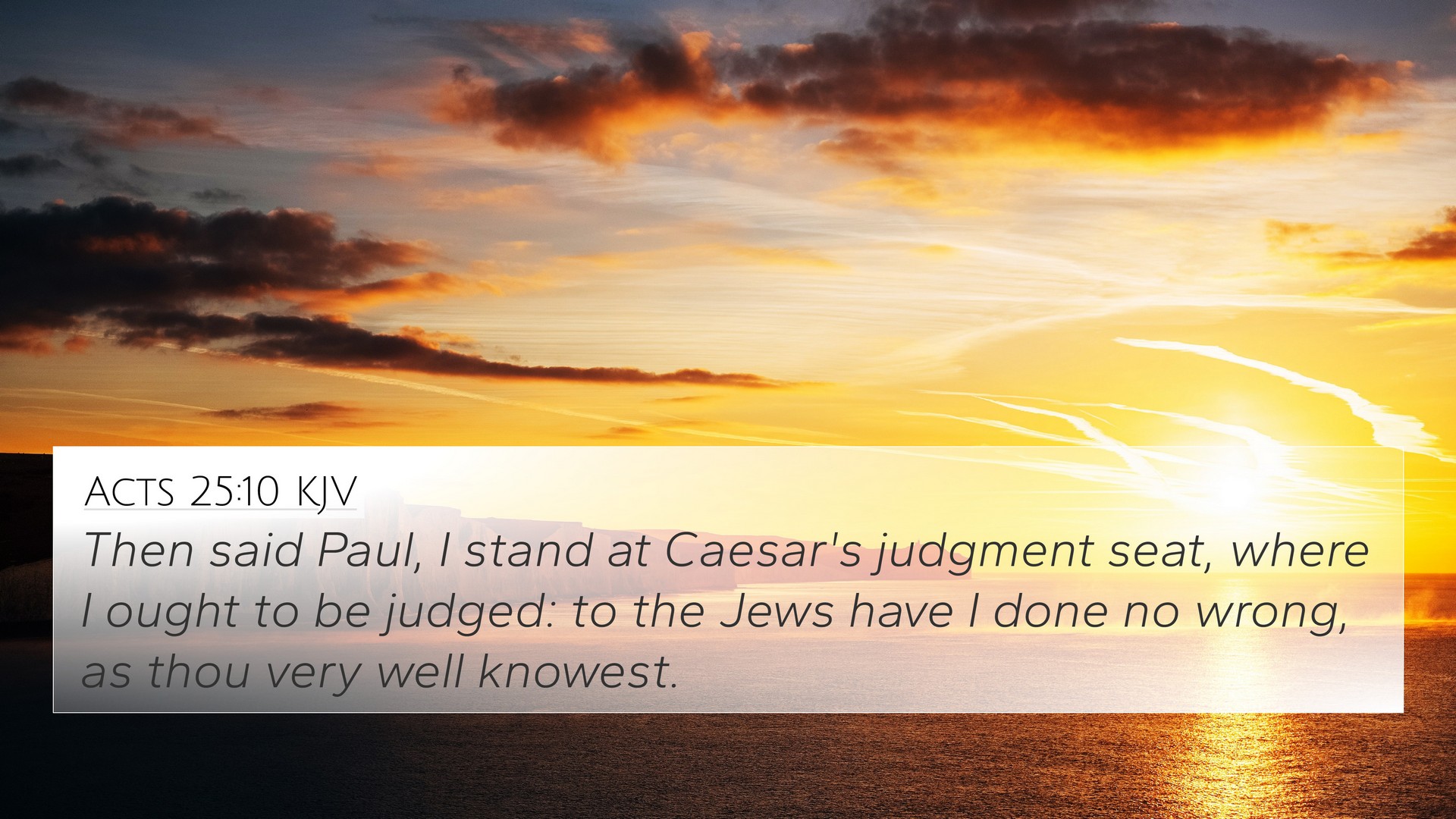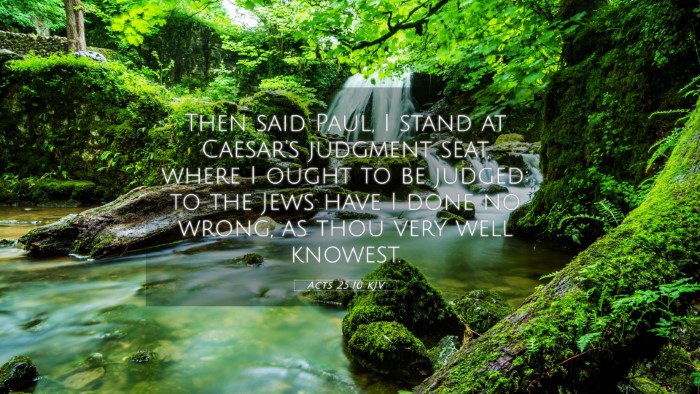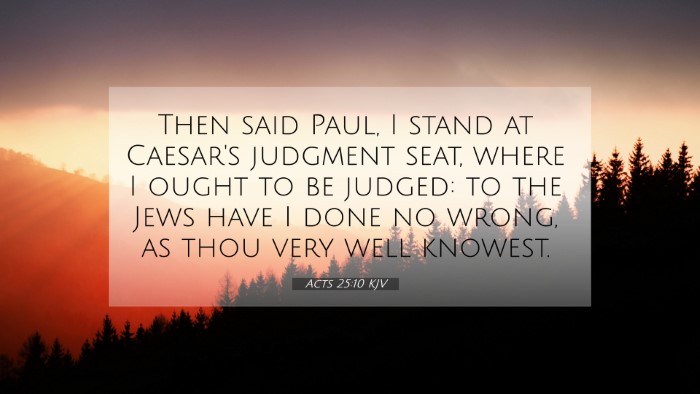Old Testament
Genesis Exodus Leviticus Numbers Deuteronomy Joshua Judges Ruth 1 Samuel 2 Samuel 1 Kings 2 Kings 1 Chronicles 2 Chronicles Ezra Nehemiah Esther Job Psalms Proverbs Ecclesiastes Song of Solomon Isaiah Jeremiah Lamentations Ezekiel Daniel Hosea Joel Amos Obadiah Jonah Micah Nahum Habakkuk Zephaniah Haggai Zechariah MalachiActs 25:10 Similar Verses
Acts 25:10 Cross References
Then said Paul, I stand at Caesar's judgment seat, where I ought to be judged: to the Jews have I done no wrong, as thou very well knowest.
Uncover the Rich Themes and Topics of This Bible Verse
Listed below are the Bible themes associated with Acts 25:10. We invite you to explore each theme to gain deeper insights into the Scriptures.
Acts 25:10 Cross Reference Verses
This section features a detailed cross-reference designed to enrich your understanding of the Scriptures. Below, you will find carefully selected verses that echo the themes and teachings related to Acts 25:10 KJV. Click on any image to explore detailed analyses of related Bible verses and uncover deeper theological insights.

Acts 25:6 (KJV) »
And when he had tarried among them more than ten days, he went down unto Caesarea; and the next day sitting on the judgment seat commanded Paul to be brought.

Acts 28:18 (KJV) »
Who, when they had examined me, would have let me go, because there was no cause of death in me.

Acts 16:37 (KJV) »
But Paul said unto them, They have beaten us openly uncondemned, being Romans, and have cast us into prison; and now do they thrust us out privily? nay verily; but let them come themselves and fetch us out.

Acts 26:31 (KJV) »
And when they were gone aside, they talked between themselves, saying, This man doeth nothing worthy of death or of bonds.

Acts 25:25 (KJV) »
But when I found that he had committed nothing worthy of death, and that he himself hath appealed to Augustus, I have determined to send him.
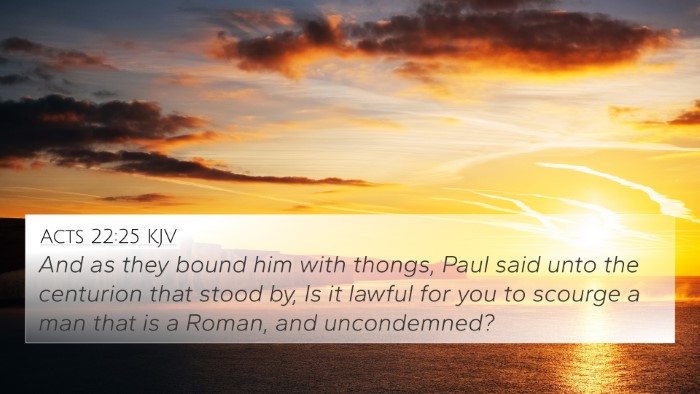
Acts 22:25 (KJV) »
And as they bound him with thongs, Paul said unto the centurion that stood by, Is it lawful for you to scourge a man that is a Roman, and uncondemned?
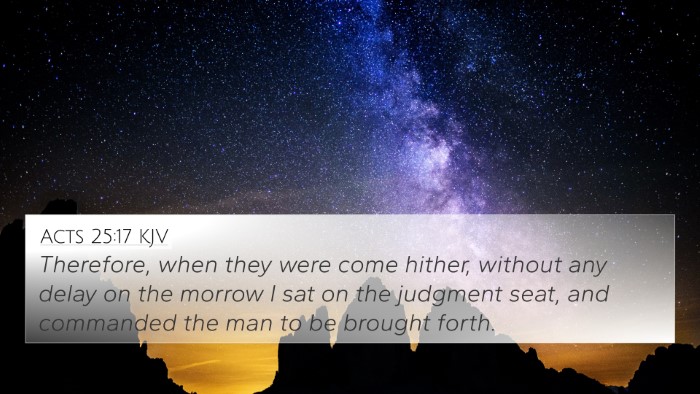
Acts 25:17 (KJV) »
Therefore, when they were come hither, without any delay on the morrow I sat on the judgment seat, and commanded the man to be brought forth.

Acts 23:29 (KJV) »
Whom I perceived to be accused of questions of their law, but to have nothing laid to his charge worthy of death or of bonds.

Matthew 27:23 (KJV) »
And the governor said, Why, what evil hath he done? But they cried out the more, saying, Let him be crucified.

2 Corinthians 4:2 (KJV) »
But have renounced the hidden things of dishonesty, not walking in craftiness, nor handling the word of God deceitfully; but by manifestation of the truth commending ourselves to every man's conscience in the sight of God.
Acts 25:10 Verse Analysis and Similar Verses
Understanding Acts 25:10
Acts 25:10: "But Paul said, 'I am standing before Caesar’s judgment seat, where I ought to be tried. To the Jews I have done no wrong, as you very well know.'" This verse captures a pivotal moment in Paul's legal predicament as he navigates the complexities of Roman law versus Jewish expectations.
Context of Acts 25:10
This verse occurs during Paul's trials after his arrest in Jerusalem. Accused by the Jewish leaders, Paul asserts his rights as a Roman citizen, emphasizing his innocence regarding the charges brought against him. His statement illustrates his reliance on the justice of the Roman system while also revealing the tension between the Jewish authorities and his missionary work.
Commentary Insights
- Matthew Henry: Henry notes that Paul’s appeal to his rightful place before Caesar demonstrates his steadfast confidence in God's sovereignty. Even under trial, Paul remains resolute, asserting his innocence and invoking the judicial authority of Rome to protect himself from wrongful accusations.
- Albert Barnes: Barnes emphasizes the significance of Paul’s position as a Roman citizen. He explains that Paul strategically leverages his rights to ensure a fair trial, showcasing his wisdom and understanding of the legal framework. This also highlights the theme of justice and divine protection over His servants.
- Adam Clarke: Clarke outlines the context critically, elucidating how Paul’s defense not only reflects his legal strategy but also his commitment to truth. He notes that Paul’s assertion of innocence may not only serve to acquit him but also stands as a testimony to his integrity before both the Roman and Jewish audiences.
Connections to Other Scriptures
Acts 25:10 serves as a nexus point for various themes across Scripture. Below are cross-referenced Biblical texts that relate to Paul's situation and the principles he stands for:
- Philippians 1:7: Paul speaks about his defense and confirmation of the gospel, mirroring his stance in Acts 25.
- 1 Peter 3:15: Encourages believers to be ready to give an account of their faith, similar to Paul's defense.
- Acts 22:25: Paul’s earlier declaration of his Roman citizenship underscores the protection it affords him.
- John 18:31: A reflection on the legal rights under Roman law can be seen where Pilate acknowledges the intricate relationship between Jewish law and Roman authority.
- Romans 13:1: Discusses the authority of governmental powers, which aligns with Paul’s appeal to Caesar.
- Matthew 10:19: Jesus assures His disciples of the divine guidance in their defense, akin to Paul’s confidence in his situation.
- Acts 16:37: Similar situations of Paul exercising his rights as a Roman citizen arise here, reinforcing his consistent approach to legal matters.
- Psalm 37:28: The theme of divine justice and protection resonates, showing that the Lord does not forsake His saints.
- 2 Timothy 4:16-17: Paul reflects on standing alone during trials, similar to the solitude felt in moments before the judges.
- Acts 24:16: Paul’s conscience is clear before God, paralleling his stance in this trial situation.
Thematic Analysis
Acts 25:10 reflects rich themes of justice, truth, and legal rights. Paul's position is emblematic of the broader narrative of believers upholding truth amidst opposition. The interplay between Roman and Jewish expectations further creates an environment ripe for exploring the implications of faith in governance and societal structures.
Tools for Bible Cross-Referencing
For those seeking to delve deeper into cross-referencing Biblical texts, several tools can assist in navigating the rich interconnections:
- Bible Concordance: Essential for locating keywords and thematic links across verses.
- Bible Cross-Reference Guide: Provides systematic approaches to studying scriptures in relation.
- Cross-Reference Bible Study: Frameworks for studying how different Bible verses correlate.
- Bible Reference Resources: Various commentaries and guides that elucidate scripture connections.
Conclusion
Acts 25:10 exemplifies a moment of profound legal and spiritual significance in Paul's life. Through cross-referencing other Biblical texts, believers can gain a broader understanding of how divine justice and human law interact. This verse serves as a reminder of God's sovereignty and the importance of standing firm in truth amidst trials.
